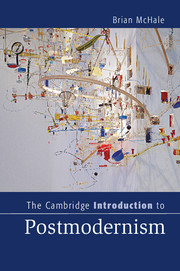Book contents
Introduction: What Was Postmodernism?
Published online by Cambridge University Press: 05 July 2015
Summary
Changing Tenses
… you've arrived too late, we are already beyond postmodernism, it's dead, dead and gone, don't you know, it's been buried, where have you been … (Federman, 2001, 245; my ellipses)
What was postmodernism? It's the purpose of this book to answer that question as concretely and circumstantially as possible, but for now, just to get us started, a colorless and somewhat noncommittal answer will serve. Let's say, then, that postmodernism was the dominant cultural tendency (it might be safer to say a dominant tendency) during the second half of the twentieth century in the advanced industrial societies of the West, spreading eventually to other regions of the globe.
When future cultural historians look back on our era – provided that human beings even have a long-term future on this planet – it's not inevitable that they will identify late twentieth-century culture as “postmodern.” Perhaps they will call it “Cold War culture,” to capture the tension and turmoil that the global standoff of the period 1947–91 transmitted to contemporary cultural expression, or perhaps they will call it “neoliberal culture,” to reflect the new global economic order that emerged in the seventies (see Chapter 3). Neither of these periodizing terms exactly corresponds to the temporal scope of “postmodern culture,” however, which seems to predate neoliberalism and to persist beyond the collapse of the Soviet Union and the end of the Cold War in 1989–91 (see Chapter 4). Maybe future historians will make do with the rather drab and inexpressive “Postwar,” or maybe they will follow Fredric Jameson, for whom postmodernism is “the cultural logic of late capitalism” (Jameson, 1991), and call it “late-capitalist culture.”
Who and what were they, these postmoderns? It is tempting just to compile a list, and many have done so, the eclectic catalogue itself being a characteristically postmodern form. “Eclecticism,” writes the philosopher Jean-François Lyotard mordantly, “is the degree zero of contemporary general culture: you listen to reggae; you watch a western; you eat McDonald's at midday and local cuisine at night; you wear Paris perfume in Tokyo and dress retro in Hong Kong; knowledge is the stuff of TV game shows” (Lyotard, 1993, 8).
- Type
- Chapter
- Information
- The Cambridge Introduction to Postmodernism , pp. 1 - 7Publisher: Cambridge University PressPrint publication year: 2015

